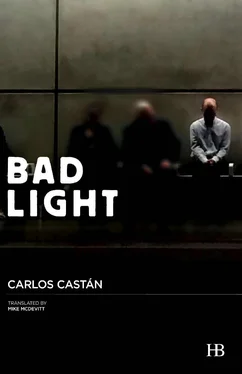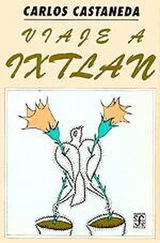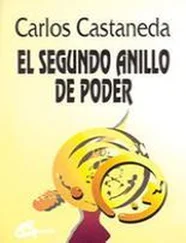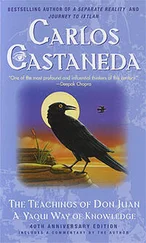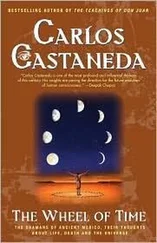Carlos Castán - Bad Light
Здесь есть возможность читать онлайн «Carlos Castán - Bad Light» весь текст электронной книги совершенно бесплатно (целиком полную версию без сокращений). В некоторых случаях можно слушать аудио, скачать через торрент в формате fb2 и присутствует краткое содержание. Год выпуска: 2016, Издательство: Hispabooks, Жанр: Современная проза, на английском языке. Описание произведения, (предисловие) а так же отзывы посетителей доступны на портале библиотеки ЛибКат.
- Название:Bad Light
- Автор:
- Издательство:Hispabooks
- Жанр:
- Год:2016
- ISBN:нет данных
- Рейтинг книги:5 / 5. Голосов: 1
-
Избранное:Добавить в избранное
- Отзывы:
-
Ваша оценка:
- 100
- 1
- 2
- 3
- 4
- 5
Bad Light: краткое содержание, описание и аннотация
Предлагаем к чтению аннотацию, описание, краткое содержание или предисловие (зависит от того, что написал сам автор книги «Bad Light»). Если вы не нашли необходимую информацию о книге — напишите в комментариях, мы постараемся отыскать её.
Carlos Castán
Bad Light
Bad Light — читать онлайн бесплатно полную книгу (весь текст) целиком
Ниже представлен текст книги, разбитый по страницам. Система сохранения места последней прочитанной страницы, позволяет с удобством читать онлайн бесплатно книгу «Bad Light», без необходимости каждый раз заново искать на чём Вы остановились. Поставьте закладку, и сможете в любой момент перейти на страницу, на которой закончили чтение.
Интервал:
Закладка:
And I was also trying, clumsily, to get across that other idea of mine, as old as it is muddled, that every human life contains within it the story of its century. Not, it goes without saying, in chronological terms, or in the form of parallels that can in any sufficiently clear-cut way be drawn. But I understood that those months back then, devoid of any hope, had been my Auschwitz, with their farewell to poetry and their sky teeming with vultures, with death hovering over everything at all hours and the lost beliefs and the broken banners. I told him that I could recognize in my own past the Jaca uprising, the face, the flesh of the woman who made me head outside into the snow to join Fermín Galán’s men, singing, armed to the teeth, all the flags pointing straight toward defeat. And I also told him that on some good days, in the darkness of the barracks, I still held out hope of having my own Normandy landing, my May of ‘68, my time of burning cathedrals, and a Prague Spring that in my dreams took the form of a whitewashed patio filled with potted geraniums, not far from the sea.
Wearing his slippers, I lit one of his cigarettes and sat down to contemplate the living room from the position of his absence. On the other side of the window, at that hour of the afternoon, it seemed that the fears that had plagued him were still there, as if blind to the fact that their prey had already been struck down by another, more potent, force of nature. The clouds circled like crows as the natural light faded little by little from the room. This was for him the most dreaded moment of the day. The blinds shook gently in the breeze that at that time of day seems to come from the most bitterly cold nothingness. I turned on his stereo to listen to “Hurt,” which had for me in recent months become something of a theme song for Jacobo in this little theater of ours. It seemed to me that Johnny Cash’s voice was closer to tears than on previous occasions.
I then got down to the business of slowly searching his drawers, one by one. I was not looking for anything in particular, and at the same time I was looking for everything. I wanted to understand something. I wanted to let the objects shape my thoughts a little, guiding them, for otherwise, without the aid of those external prompts that at times conjured up precise instants, at others long stretches of time, my thoughts could not run freely. It’s strange what the silence of a dead man’s things has to say for itself and the way such objects have of keeping still. Some of them, a pair of glasses with an outdated prescription painstakingly preserved in their case, say, or an old wallet stuffed full of expired ID cards, appeared to have gotten a head start, surreptitiously and under their own steam, on their owner’s death, for they had for some years now lain in the gloomy recesses of a wooden drawer, locked away and forgotten. Most of our things die before us, they said their goodbyes some time ago without our noticing. Others, meanwhile, those that outlive us, make no bones about the sudden interruption of everything — items of clothing with his sweat on them in the laundry basket, drinking glasses bearing the outline of lips now forever sealed, reminders of doctor’s appointments he should have gone to the next week, prescriptions awaiting a trip to the pharmacy, tickets for a play that has yet to open in the city, an almanac on his writing desk with a whole ream of pages that now serve no purpose, and the hundreds of scraps of paper scattered here, there, and everywhere (Post-it notes on the refrigerator door, napkins from bars, dog-eared Moleskines) with snippets that could have amounted to something, who knows, perhaps poems or something of the sort, ideas for an article, fragments of letters that went nowhere.
I needed to understand something, to get some inkling of who might have killed him and why, and as things stood, I had nothing, other than the certainty that he had feared this attack and that the police had ruled out the motive of robbery. When I arrived at Jacobo’s apartment, I had Lorazepam coming out of my ears. Though that state of extreme sedation didn’t exactly help me get my thoughts in any proper order, I felt sure it was the only way to face the ordeal of entering his apartment alone, of seeing the blood stains on the wall, and of finding myself among his things once more. Even so, I gave a start at the slightest noise from the upstairs apartment or the inner patio. It’s impossible not to feel like an intruder when rooting though the pockets of a dead man’s coat, rummaging around in his nooks and crannies, reading all his papers.
10 (one day the investigators will come)
I returned home in something of a daze, without having gotten a single thing straight in my mind. I thought it would be best to go back another day when my thoughts were a little less cluttered and I had some idea of which way to turn or where to begin, anything other than turning up and grabbing some object, then caressing it awhile before putting it back where I’d found it, which was more or less all I’d done the entire afternoon. I opened the front door to find my apartment particularly silent, and as if tainted by a half-sickly light, of the sort that leaves everything tinged with ennui. In my listless state and as if spurred on by a strange inertia, as if the detective work I had undertaken in Jacobo’s apartment just moments before had somehow carried over, I began to see my own possessions as if they belonged to someone else, in other words, as if I were in some way dead, or worse, and someone had wandered in and begun to survey my things, the mess, the furniture, the books, in a bid to find something out about who I was and what my undoing had been, the ultimate reasons for the disaster, for my aimless drifting and my empty hands, for the shadows that cut through me, and all the rest besides. In one of those folders I hadn’t opened in decades, I came across a handful of letters sent to me a long time ago, most still inside their original envelopes, as well as the odd draft of others penned by me, which I must have set aside at the time in order to keep a copy, to what end I no longer know. I picked one at random, addressed to the first girl who ever truly got under my skin, back in my high school days. The first thing that struck me was how little I remembered of her. While I could clearly recall a pair of her dresses and could sketch the door to her apartment block on the Calle Costa Rica, her face was much harder to summon.
Dear Magdalena ,
They told me that I’d forget you, that all this pain would little by little ease and that a few years from now I’d again be able to stroll calmly down the streets I roamed with you and again enter the bars in which we got drunk together, and even sit down again in our usual corner at the end of the bar, under the same darkness as back then and that music that enveloped us, without panicking at the sudden emergence of a memory that might again bring back the taste of punch on your tongue or the image of my hands creeping up your thighs, of your raised skirt and your moist panties on the bar stool .
They told me that’s what always happens. That the sorrow passes like a mountain storm and gives way to other suns and other skies, taking with it the pitch-black sea of clouds that roared before up on high like the sky of Golgotha over the wooden crosses on which flesh hung, now dead. They told me that my life would carry on and that things would happen in the future and that there would be more travel and women and also more desire, why not, and that one day, almost without my realizing it, a time would come when I would once again sleep the whole night through, I’d see, and that I’d again eat at mealtimes and would be able to get by without the hundreds of pills in my silver case, without having to drink on an empty stomach, without clawing at my skull, and that I’d no longer feel the desire to make bloody tracks on my arms and hands with a box cutter .
Читать дальшеИнтервал:
Закладка:
Похожие книги на «Bad Light»
Представляем Вашему вниманию похожие книги на «Bad Light» списком для выбора. Мы отобрали схожую по названию и смыслу литературу в надежде предоставить читателям больше вариантов отыскать новые, интересные, ещё непрочитанные произведения.
Обсуждение, отзывы о книге «Bad Light» и просто собственные мнения читателей. Оставьте ваши комментарии, напишите, что Вы думаете о произведении, его смысле или главных героях. Укажите что конкретно понравилось, а что нет, и почему Вы так считаете.
